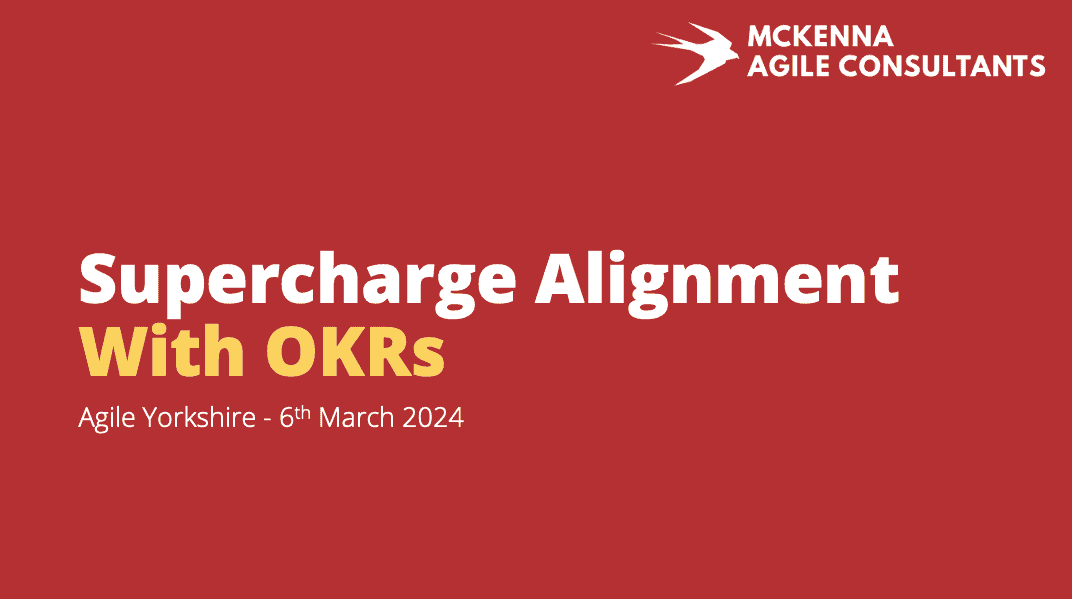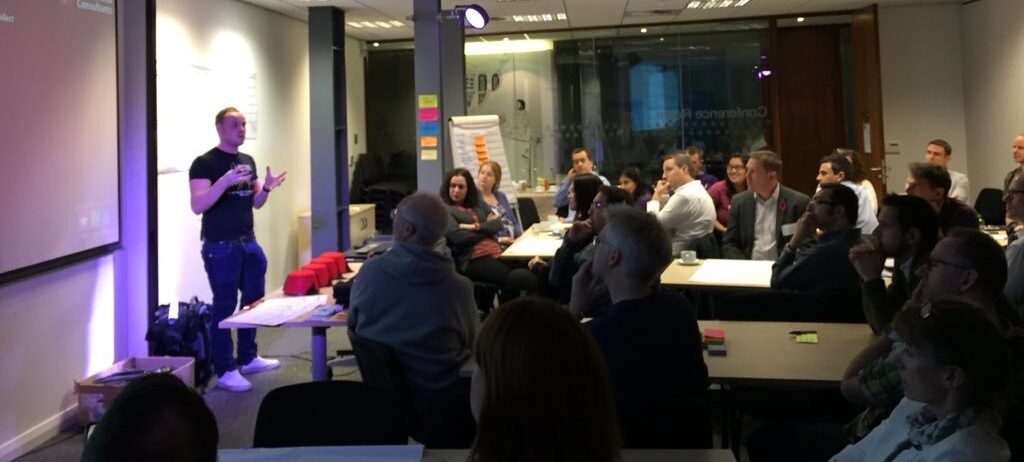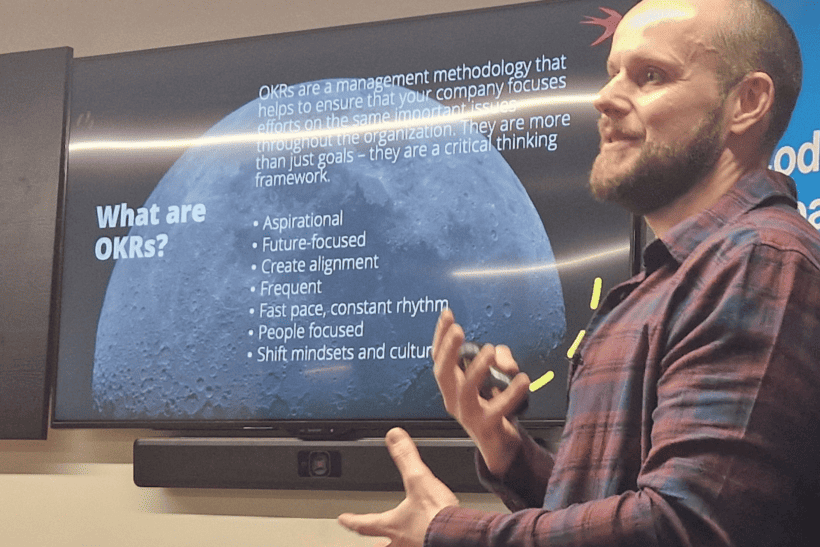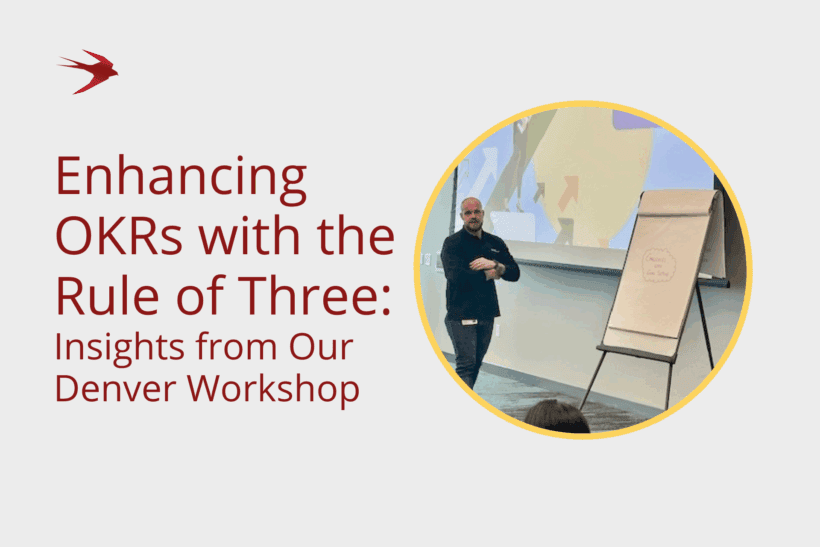After an 8-year gap, we finally made it back to Agile Yorkshire in March 2024 where Aaron Mckenna delivered a talk on “Supercharging Alignment with Objectives and Key Results”. This talk gave practical guidance to people who were looking to know more about how OKRs can be a transformational tool in elevating your strategy execution.
This was the first in-person event that we had spoken at since COVID put a halt to many in-person meet ups. As this felt like a significant event, we thought that we would share some insights following our talk.

McKenna Consultants and Agile Yorkshire
Before we look at the insights, a little bit of history around McKenna Consultants and Agile Yorkshire. We originally started being a part of the Agile Yorkshire community when it first started in the early 2000s, regularly speaking at and attending meetups in the back of a pub behind Leeds Town Hall. Back then, it was a small group of software development professionals who were tentatively exploring this new craze of agile.
Our CEO, Nick McKenna, held the role of treasurer for a number of years and we could even attribute lots of our existing client portfolio to some of the relationships that we forged all of those years ago. We’ve delivered talks such as “There Is No Agile” and “SAFe Planning In Action” to practice and hone our skills as conference speakers as we established ourselves as part of the local agile community.
When we learned that Agile Yorkshire was back and looking for speakers, we were only too happy to lend our support and get involved. Agile Yorkshire is back!

Insights from the Talk
We were taken aback at the amount of well thought out questions from the audience about the implementation of OKRs. Here are some of the questions, and how we answered them:
How to incorporate performance management with OKRs?
Let’s start with perhaps one of the most asked questions. Although much of the OKR theory states that you should not tie performance management to OKRs, many companies do so. The 2023 Global State of OKRs report stated that 56% or companies use OKRs to help inform employee performance evaluations, 17% of companies use them as the primary factor and 27% do not link OKRs to performance at all.
The real answer to this is highly context specific and will vary from company to company. If this is something that you’re considering, these are the things that we would recommend you consider:
- Consider the impact of linking OKRs to performance – Will this hinder the aspirational nature of your OKRs? Will this lead to unwanted behaviours?
- Do not fall into the trap of cascading OKRs to the individual level – Not everyone can contribute to meaningful change alone and individual OKRs can slow you down, adding extra overheads that distract teams away from working towards meaningful organizational goals
- With individual OKRs, employees could focus on their own goals over the company’s or team’s, leading to detrimental behaviours and a shift from group thinking towards individual thinking
- Try to find a balance between the company performance, individual performance, contribution towards OKRs and personal development. The companies that are most successful make this dynamic work for them.
What change management approaches have you used with OKRs?
We were introduced to the ADKAR model in Prosci and haven’t looked back since. With all of our change transformation work, whether it’s agile, scrum, SAFe or OKRs , we start with completing a lightweight change management plan. This ensures that we and our clients understand the outcomes, the people impacted, the plan and importantly how to sustain the change.
How quickly would you expect to see feedback in your OKR cycle?
This is a tough one and depends entirely on your current level of maturity when it comes to execution. If you already have a solid execution rhythm established, such as Scrum or SAFe, you can start to track against your OKRs quickly – in your first sprint. If you’ve not got a formal execution rhythm in place, this could take you up to the end of your first quarterly OKR cycle. The book Radical Focus by Christina Wodtke is a great read that offers some advice on setting up a lightweight OKR cycle.
Other considerations are around the type of product or service that you’re supplying. If you’re building an online store, where data and trends are readily available then you have more chance of seeing rapid feedback than a manufacturing or construction company.
If we are doing Scrum and then use OKRs too, does this mean the death of the Sprint Goal?
OKRs do not have to be implemented at the expense of something else that is working. We’ve worked with teams who have used OKRs in Scrum successfully. Instead of replacing the Sprint Goal with the OKR, instead ask the question; “how does this sprint positively impact our OKRs?”. From this, you can craft a meaningful Sprint Goal. Not every Sprint will fulfil a key result – it can be iterative progress.
How can I integrate OKRs with Kanban?
Like the question around Sprint Goals, how can we leverage what is great about Kanban and the process that you have to accommodate OKRs? Can you introduce an OKR class of service? Can you use WIP limits to help reduce the amount of non-OKR work? Do you even need to make any changes at all?
How do you prevent people from doing a bad job with OKRs and in doing so, give a bad reputation to OKRs within the organisation?
This is a valid concern and reminds us of the early days of agile. A member of the audience explained that their company had done OKRs in such an inefficient way that people had started to grow frustrated and lose faith in them.
Our first response is that if you feel like you’re doing OKRs inefficiently, you should stop and seek some guidance. Done right, OKRs are a powerful tool in your strategy execution, don’t let a half-baked OKR implantation prevent you from the benefits.
The Power of Community in Agile
It felt great to be back around the agile community to share ideas, network and learn. It was clear that while people are enjoying the benefits of more flexible working post-COVID, there is still a hunger to be face-to-face for the social and community building aspects. Rest assured, we will do all that we can to be at this event and more events like Agile Yorkshire in the months and years ahead!
Try our AI-powered strategy and OKR assessment tool to self-assess your strategy and OKR maturity.


